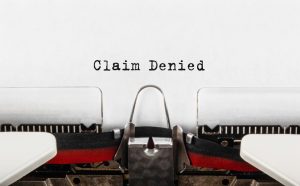Explore the Possible Scenarios After Losing an Injury Claim

When you take a personal injury case to trial, there is a possibility that you may not win. It frequently has little to do with you or even your attorney exclusively. There can be several factors that cause your side to lose. Maybe there just wasn’t enough documentation, or perhaps you minimized (or exaggerated) your injuries without meaning to. Maybe the jury didn’t understand the judge’s instructions or didn’t get to hear your complete side of the story. Perhaps one of the expert witnesses was very nervous and didn’t speak confidently. There are so many possibilities that it is hard to speculate as to why a personal injury claim is unsuccessful, but there is some good news.
The Goal of a Personal Injury Claim in a Nutshell
It is a civil case where the plaintiff has the right to claim injuries were suffered because of someone else’s negligence. In New Jersey, there is a 2-year window between the accident date and the filing date with the court. The goal is to be awarded economic compensation for lost wages, medical expenses, legal costs, and emotional distress. Also, if your injury is so severe that you can no longer work, a substantial award is key to keeping you economically afloat.
What are my Rights if I Lose my Claim for Injury Compensation?
If you lose your personal injury claim, a jury has not decided in your favor, and you will not be awarded any damages or other costs from the defendant, even when your injuries are grave. If the opposing side is not found liable for your accident and, ultimately, your injuries, they do not have to pay for your medical costs, legal costs, or other damages. You can appeal if your lawyer believes that the judge or jury made a mistake in the trial process. Winning an appeal is not easy, but it is certainly within the realm of possibility. It is essential to have a lawyer who is familiar with personal injury cases and knows how to assert your right to appeal and effectively fight to prove that the outcome was unwarranted.
What are the Legal Fees If I Lose my Case?
Personal injury lawyers usually work on a contingency, so when you win your case, they will receive a percentage of the amount you are awarded. When lawyers work on contingency, that means that if they do not win, they do not get paid. This is an advantage for you as it allows you to choose an attorney you feel is a good fit, not necessarily one based on cost. Also, any expenses related to your case, such as those for expert witnesses (who are paid for their time and expertise), filing fees for any paperwork that must be submitted to the court, deposition transcripts, and other expenditures related to your case.
Who Will Cover My Medical Expenses if My Lawsuit is Unsuccessful?
During the personal injury claims process, your medical bills are your responsibility. Frequently, when health providers are made aware that litigation is a factor in payment, they will agree to a partial payment or payment plan until the trial is over. Your settlement will include reimbursement for the bills you had to pay and possibly for future medical treatment. If you do not win, you can set up a payment plan (if you haven’t already). You may be able to file a claim with your insurance provider, which will help with your medical bills. Another option is to take out a loan from a bank or family member or pay with a credit card. Although none of these options is very attractive, you could also consider a discount option for paying the amount owed in one lump sum.
Your last option, although viable, it is not recommended, is to file for bankruptcy. If you simply do not have the means to pay your doctors for their services, filing for Chapter 7 bankruptcy will allow you to liquidate your assets, pay your debts, and discharge (erase) any balance left over). If it is determined that you do not qualify for Chapter 7, you can file for Chapter 13, which allows you to restructure what you owe and pay it back over a given period (3 to 5 years). If a balance is still owed for your medical debts after that period, it may be discharged by the court.
What Are My Chances if I Appeal the Decision?

Not everyone is eligible for an appeal. Sometimes, you must take it on the chin and move on, but some lost personal injury cases were successful in their appeal. An appeal is based on an issue of law rather than fact. That means a legal mistake was made during the trial that jeopardized your ability to win your case.
Some examples include jury misconduct (discussing the case with people not on the jury, not disclosing conflicts of interest between a juror and either side of the case); part of the evidence was not seen because the judge did not allow it, there was not enough evidence to clearly decide a verdict or an expert witness was not considered well-versed enough in the topic to be seen as an expert.
The Civil Appeal Process in New Jersey
The appeals process is quite complex, but the following provides a relatively simple outline of the steps and requirements. Your attorney will file a notice of appeal with the Appellate Court. The defense will file a motion to dismiss the appeal. In a hearing, your attorney proves why the decision against you was contrary to legal procedures. The judge will make a ruling to either accept or deny your appeal. Although it appears simple, there is a lot of preparation and hard work on the part of your attorney.
Something to consider is that sometimes defendants would rather settle than go through the expense of another trial. Your attorney can negotiate a settlement at any point. Appeals can take years, even when you know you are right. It may behoove you to accept what you are offered before going to court again.
Potential Results After Filing an Appeal
There are three possible outcomes. The first is a reversal of the lower court’s decision by the Appellate Court, a great result. The second is an affirmation of the lower court’s decision; thus, you lose again. The third result is neither a win nor a loss but a second chance to prove that you should win. The appellate judge sends your case back to the lower court for further proceedings, typically with specific instructions to guide the new trial. The last quasi-result that blends a few of these is a modification of the lower court’s ruling.
Avoid Losing a Personal Injury Case with Excellent Legal Counsel
Personal injury cases are complex and require an attorney who knows the law and is an excellent strategist. At Cohen & Riechelson, our personal injury lawyers excel at building a solid case for our clients. You need an attorney who will listen to your concerns and fight for the damages that are rightly yours due to someone else’s negligence. Don’t let this opportunity go by when we are ready and able to stand beside you and demand that you be heard.
Contact our local office in Trenton, where we serve clients in Lawrence, Hightstown, Mount Laurel, South Brunswick, Titusville, Ewing, Princeton, and towns in Mercer, Burlington, and Middlesex County. Call us today at (609) 528-2596 or get in touch with us online to get a free and confidential consultation and get started on making you whole again.

